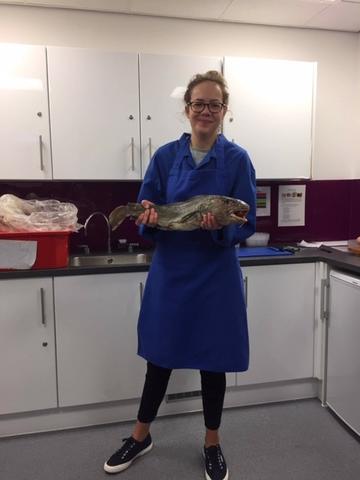'I think a big challenge for people trying to make decisions about healthy and sustainable diets is feeling overwhelmed,' says Dr Anneli Löfstedt, a postdoctoral researcher with the SHIFT project and member of the Smith School of Enterprise and Environment. 'What is healthy? What is sustainable? It is easy to feel a bit lost as a consumer. Part of what I want to do as a researcher is try and demystify this and help people eat more healthily and have a lower impact [on the environment] from their diets', she continues.
Löfstedt's route into sustainable food systems research began as a child, spending summers in Sweden with her family. It was there that she first learnt to fish. 'I got excited about the fish we caught, how big they were, what they were eating. Every time we got back from fishing, I created a log detailing how many fish we caught, their species, their weight and what the fishing conditions were'. Löfstedt's love of fishing and interest in fish led to summers helping carryout fish stock surveys across lakes in southern Sweden, before an undergraduate degree in marine and freshwater biology, followed by a Masters in Marine Environmental Protection. It was at the University of Aberdeen that Löfstedt began to consider how aquatic foods can contribute to health and environmental goals. Fish are 'a great source of lean protein, omega-3 and micronutrients such as vitamin D3, selenium, zinc and iron'. To consider how we might rethink our relationship with seafood, Lofstedt and colleagues modelled novel harvesting strategies, optimising for quality (nutrients) as opposed to quantity (yield). In the case of Atlantic mackerel, they found that when maximising for nutrients, fishing rates were lower.
Instead of optimising for yield, could we optimise for nutrients?

During her time as a postdoctoral researcher at the Rowett Institute, funded by the Scottish Government, Löfstedt and colleagues mapped the UK seafood supply chain. They created a unique database linking seafood production (capture and aquaculture), trade (imports and exports), purchases, and consumption to species level between 2009 and 2020. They then took the analysis one step further and mapped the nutrient flows and found that the UK undergoes large losses of omega-3 fatty acids and vitamins B12 and D3, mainly through exports of oily fish. This should encourage policymakers to promote increased consumption of locally produced oily fish species for public health and improve the resilience of our seafood system. Fish, Löfstedt considers, are undervalued in their importance. 'A lot of the time in figures, we see fish lumped with animal source proteins, when comparing carbon footprints. But the carbon footprints of fish vary significantly between species. At the one end you've got farmed salmon and tilapia, that require a lot of freshwater use, and at the other end you've got mussels and oysters, just sit in the water and filter-feed'. There is therefore, a place for her knowledge and expertise in the conversations around dietary change. Dietary recommendations around fish consumption vary significantly between European countries, for example, those with longer coastlines and cultural histories of fish consumption - Norway, France, Spain - have higher fish consumption recommendations than landlocked countries. Are there ways we can encourage the public to consumer more fish in a sustainable way?
Löfstedt's work on the SHIFT project examines what UK food policies currently exist, if they achieve their aims, what our diets might look like in the future and how this will impact different income groups. 'If people are going to be eating less meat and dairy, what are they going to be eating instead?' she asks. It is not always as simple as simply substituting meat with another protein-based product, or thinking how we might eat more locally. What impacts do these changes have on our nutrient intake? And our many varied choices can make decision-making harder too. We need to make sure it is a just transition, Löfstedt says, 'we cannot leave anyone behind'.